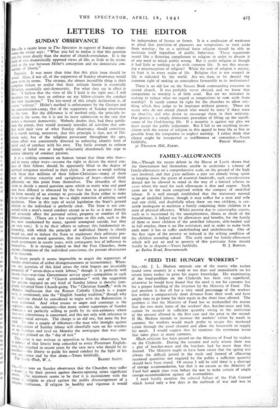LETTERS TO THE EDITOR
SUNDAY OBSERVANCE
su,—In a recent letter to The Spectator in support of Sunday obser- vance the writer says: " What you fail to realise is that this question cuts far more deeply than the matter of church-attendance. It is the clash of two diametrically opposed views of life, as little to be recon- ciled as the war between Hitler's conception and the democratic con- ception of liberty."
Precisely. It was more than time that this plain issue should be stated. Most, if not all, of the supporters of Sunday observance would agree with its terms. The strange, the almost incredible thing is their complete failure to realise that their attitude herein is essentially Hiderian, essentially anti-democratic. For what they say in effect is this: .` I believe that the view of life I hold is the right one; I will therefore try my best to enforce on my fellow-citizens the conduct this view inculcates." The key-word of this simple declaration is, of course "enforce." Hitler's method is enforcement by the Gestapo and the concentration-camp; that of the supporters of Sunday observance by the vote. But the difference is of method only, the principle in- volved is the same, for it is not its mere submission to the vote that makes a measure democratic. -Nobody doubts that, had these gentle- men the power, they would instantly interdict all activities that con- flict with their view of what Sunday observance should constitute. It is worth noting, moreover, that this principle is that, not of Hit- lerism only, but of the religious persecutor throughout the ages, whose effort was consistently directed to enforcing identity both of belief and of conduct with his own. The futile attempt to enforce identity of belief was at length reluctantly abandoned; the urge to enforce identity of conduct persists.
It is a striking -comment on human nature that those who thus— and in many other ways—assume the right to dictate the moral con- duct of their fellows should, be ,apparently blind to the degree of spiritual arrogance Involved in their claim. It seems to weigh nothing with them that millions of their fellow-Christians—many of them men of obvious sincerity and uprightness of heart—should think differently on this point from themselves. The absurdity of their claim to decide a moral question upon which so many wise and good men have differed is obscured by the fact that in practice it takes the form merely, of an attempt to persuade the State either to make or to refuse—as•the case may be—a slight extension of existing social legislation. Now in this type of social legislation the State's general relation to the individual is perfectly clear. The State is not con- cerned with a man's moral conduct except in so far as it may directly and adversely affect the personal safety,. property or comfort of his fellow-citizens. (There are a few exceptions to this rule, such as the law, now condemned 'by many, against- attempted suicide, but they are very rare.) It is by their efforts to subvert this fundamental re- lationship, with which the principle of individual liberty is closely bound up, and to induce the State to implement their arbitrary pro- nouncements on moral questions, that the Churches have stirred up much resentment in recent years, with consequent loss of influence to themselves. It is -strange indeed, to find the Free Churches, those ancient champions of the individual conscience, the present obstructors of its function. • To many people it seems" impossible to acquit the supporters of Sunday observance of either disingenuousness or inconsistency. When- .'ver any question_ of this kind arises the twin bogeys are invariably presented of " seven-days-a-week labour," though it is perfectly well known that—war-time Government service apart—compulsion to such labour is illegal, and of "Church attendance " with the suggestion that anyone engaged on any kind of Sunday labour is thereby com- pletely debarred from Church-going. The " Christian Suncity," with its offensive imPlicauon that the Roman Citlictlic Church is a pagan body, is mentioned; also the "English Sunday tradition," though why this tradition should be considered to begin with the Reformation is sever .explained. And what rouses to anger and' contempt is the 'osPicion—nay, the certainty—that many ardent supporters of Sunday observance are perfectly willing to profit by its non-existence where heir own convenience is concerned, and this not only with reference to necessary social services. The charge is an old one, but none the less salad To take a couple of inItances—the man who inveighs against the wickedness of Sunday labour will cheerfully turn on his wireless 'et on Sundays and read on Monday the newspaper that was com- Posed and printed on the " day of rest." This later is not written in opposition to Sunday observance, but in defence of that liberty long conceded to every Protestant English- man, but attacked in recent years by the very men who should be its guardnin—the liberty to guide his moral conduct by the light of his own con. .fence and by that alone.—Yours faithfully,


























 Previous page
Previous page